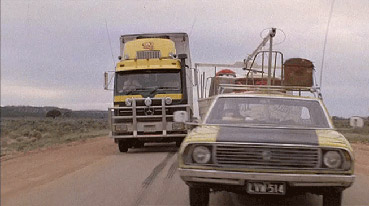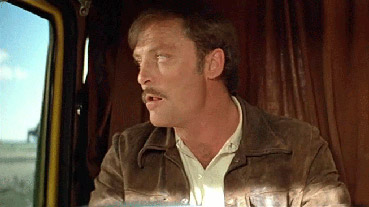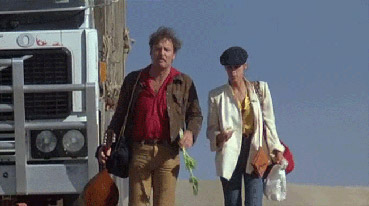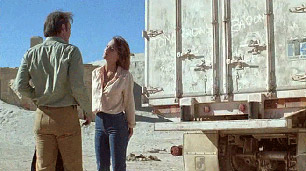| "Madam, just because I drive a truck does not make me a truck driver." |
| Pat Quid's (Stacy Keach) attempts to pull himself clear of cliché |
And in that rather smart line lays
the soul of Road Games; a suspenseful
flirtation with what might be, conclusions drawn based
on seeing the shadow, not the body casting it. In essence,
Road Games is a distinctly Australian Rear
Window (but
through the front windscreen). I will attempt to be objective
given that the movie's director, Richard
Franklin, who
died a few days shy of his 59th birthday last year, was
one of my closest friends. This won't be as hard as it
may seem because although Road Games wasn't
my introduction to his oeuvre (that was Psycho
II), the memory of a mid-80s
late night screening as well as a few recent DVD screenings
have convinced me, friend or no friend, that this is
one classically made, oddly charming thriller, a robust
and slick movie that convinced the world that Richard
was destined for Hollywood – destined perhaps but as Hollywood
became more suited to Armani (so to speak), then Richard
became less suited to Hollywood. Later in his career, he
was to stand firmer on the truth of the statement "one
more day in L.A. is another day wasted..."
It was (I emphasize 'was')
perhaps a rather strange prejudice of mine that I believed
for a long time that genre expertise was country specific.
Yeah, I know. All profound dissertations on life, love
and death came from Sweden. Westerns (despite their historical
roots) came from Italy. The Brits made insular kitchen
sinkers while the thriller was an American genre and woe
betide (what a wonderful expression that is) any whippersnapper
who crosses boundaries. Well, hullo there, Mr. Franklin!
In the late 70s and early 80s, Australian cinema nudged
its northern hemispherical neighbours and said "Oi, check
this lot out!"

And there they were, Oz's own movie
brats, making films of distinction and commercial viability.
The celebrated and money-makers were Bruce Beresford,
Peter Weir, Fred Schepisi and George Miller. Wading around
in the disreputable 'thriller' pool was Richard Franklin.
I say 'disreputable' because unlike movies about schoolgirls
who disappear on a picnic (...at
Hanging Rock), drunken,
politically minded party revelers (the wonderfully hilarious
Don's Party) and dramas about disgraced
army commanders (Breaker
Morrant), where was the artistic merit in
making thrillers? Well, Hitchcock may have had something
to say about that if he hadn't died in 1980.
At the University
of Southern California, in film classes, Richard rubbed
shoulders with John Carpenter and George Lucas. It was
the late 60s and the auteur theory was entrenched in cinema
studies. For those who speak no French, the auteur theory
was a self-aggrandizing bit of nonsense invented by a couple
of precocious French critics in order to get noticed as
film-makers, something they owned up to eventually. The
theory's essence is that the director is the 'author' of
the film, his/her artistic outpouring and 100% so. This
blathering nonsense gave birth to the utterly silly "A
Film By..." title that graces Hollywood movies these
days. Hitchcock enjoyed this kind of faux-intellectual
attention (culminating in the afore-mentioned, rather
superb and rightly famous one-long-interview book Hitchcock
by revered French film-maker, Francois Truffaut). According
to screenwriter William Goldman, the venerable old man
fell for it much to the detriment of his subsequent output
(praise feels good, I've had some myself). Excessive
praise from two smart French guys can turn a director's
head.
But Hitchcock's position in world
cinema was still down in the murky end, critically speaking.
To quote Richard's tutor at the time of his burgeoning
cinematic education – Hitch
was one of a few "tired, old hacks..." still
working. He made thrillers not profound treatises on human
existence. Intellectually, Francois Truffaut pulled Hitchcock
up a notch with his book published first in 1967 and in
the same year, a young Richard Franklin persuaded the great
man to turn up at USC and lecture, much to his in-house
lecturer's displeasure; Richard's subsequent assisting
Hitchcock on Topaz cemented the film student's
professional regard for the master of suspense and he went
back to Australia and made the film which put him front
and centre to direct the sequel to one of Hitch's most
famous thrillers,
Psycho. In Road
Games, it is no coincidence the hitch-hiker's
name is, ahem, 'Hitch...'

Pat Quid drives trucks (see the
quote above). He's intelligent, self-taught, he speaks
in other people's quotes, is curious and willfully imaginative.
It's this imagination that starts him on a road (sorry)
of intrigue and on the trail of a suspected murderer. After
letting his dingo out of his truck for his early morning
ablutions, Quid notices a gloved hand holding back motel
curtains with its owner watching the trash men do their
job. Earlier, we have seen a highly stylized murder of
a young woman with a guitar string so we know Quid's suspicions
are on the money (it may have helped the film's mystery
if we'd not been so sure the girl was murdered but then
this would not have helped to sustain the menace throughout).
Also, I'm certain that Richard and screenwriter Everett
De Roche had worked all this out. I spent a lot of time
with these two gentlemen way back in 1985 and the care
lavished over plot and attention to detail was extraordinary.
The
gloved man, a rarely seen character in a green van decorated
with an angry spider spray painted on the side, is on
the same route as Quid on his way to Perth. They are
accompanied by a cast of characters all turning up at
the same gas stations and motels along the way in the
same way that strangers often meet in pub toilets (bladder
relief symmetry) without the slightest intention of doing
so. What draws the audience in is an almost cinematic non-starter – a
lone individual talking to himself. It takes some balls
to make that into a thriller. Yes, Quid has his dingo/dog
Boswell, someone to talk to but you soon accept the idiom
of Quid's cheery isolation and literally go along with
the ride.
Quid's suspicions are fuelled by
radio reports and fellow travelers' tales. He tries to
inform the authorities but in this era, in this place
(the east west road to Perth, all 1600 hundred miles
of it), law is something that only happens somewhere
else. After he picks up a hitcher (Jamie Lee Curtis was
not yet fully established in the stardom firmament in
1981), he expounds his ideas about the gloved man and
she gleefully joins in with the conspiracy theories.
Cornering the suspect at a bar stop, Quid loses his hitchhiker,
'Hitch', to the suspected killer and in a panic goes to
make chase. He commandeers a motorcycle and extremely realistically
(and I mean extremely) he loses control and crashes into
tyres and delivers the best version of the expletive "Shit"
I've heard in the cinema. Only John Belushi's"Holy
Shit-tah!" from Animal House comes
close.
Not to give anything away, all
the signposts are nicely played out and a compromised
ending (Richard had to wrap two days early) doesn't feel
compromised in the least. It's wildly implausible, sure,
but in the way it's executed, it doesn't feel out of
place. Richard told me of the ending he had originally
planned and it breaks my heart that I can't recall what
was originally scripted. But what's important is that
the ending works as is. What elevates Road
Games is a
number of slyly humorous contributions, not least Richard's
own. Yes, they could be Everett's (the scriptwriter's)
ideas but I've known Richard long enough to recognize
elements of his own personality within his movie. Gosh,
Richard was an 'auteur'! He would have laughed that one
off with one of his earthy Australianisms.

Several instances
of this playful dark humour stand out. The first murder
in the motel is preceded by the victim tuning a guitar.
Not only is she about to be garroted by a guitar string
but the sound of her tuning is that of a single guitar
note going further and further up the scale – a
stereotypical 'suspense' score on one note performed by
the victim herself. Ever seen that in a movie before? As
the main title disappears, a man pushes another pig carcass
into Quid's truck. It's no coincidence that both man and
pig have similar pink tattoos on their bodies. On a billboard
there is the wonderfully ambiguous notice reading 'Butchers
Strike Again'. The gag is in the context (Quid hauling
meat whilst chasing a man who cuts up human beings). There
is also a very sly nod to Hitchcock (aside from the hitchhiker's
nickname and a magazine cover with the man himself in Quid's
cab) in a shot from Quid's POV looking out on the road.
As we move forward, Richard's camera is slowly zooming
out which makes for a very curious lengthening effect.
Try it yourself with your camcorder. A lot of people credit
Spielberg with the origin of this trick (Brody's first
experience of a shark attack in Jaws and
RIP Roy Scheider who died last Sunday). The credit belongs
to Hitchcock, shooting Scotty's POV in Vertigo as
he looks down at the stairs he's just climbed. The track
forward, zoom out effect is quite a neat trick of cinematic
punctuation.
Also noteworthy is a pre-Mad
Max 2 score from Brian May. An odd cross between
Holst's Planet Suite's Mars and Ravel's Bolero in places,
it includes a jaunty main theme incorporating a mouth
organ solo (played at certain points by Stacy Keach
himself). It's very hummable and suits the film wonderfully.
But there is a caveat to a good review of the film
itself and in this case it's the DVD's presentation.
Inexplicably (does anyone care these days?) the DVD
is presented in the wrong aspect ratio making a mockery
of direction and camerawork. Comparisons with the Region
1 Anchor Bay release dramatically illustrate my point.
But the same corporation (Canal +) was responsible
for both versions. At what stage was this film digitally
mastered for Region 2 and didn't anyone bloody notice?
The
freeze frame under the end titles reads "OMORROW'S BAC".
Does that make any sense to you? No, me neither. I'm
sorry but, like Quid's pigs, I was gutted to find one
of the few true 2.35:1 movies to have a good reason
for the aspect ratio (ever looked out of an HGV windscreen?)
presented in this horrible compromise 1.78:1. Why would
anyone... I don't need to finish that sentence. Companies
take short cuts to make money but this short cut is
particularly damaging to the experience of viewing
what is presented. In two-shots, characters are uncomfortably
squashed into the edges of frame, characters who should
comfortably occupy said areas. I'd like to think this
is simply a mistake on the review copy but as the incorrect
aspect ratio is repeated on the notes accompanying
said disc, I doubt it.
The
screen grabs below clearly illustrate the cropping
issue when compared
to Anchor Bay's region 1 US
release |
|
|
|
|
The print isn't in great condition.
It looks soft and grainy in places. There's a fair amount
of dirt but nothing that detracts from the enjoyment
of the film (except the framing). The Dolby stereo soundtrack
is serviceable with no noticeable rear speaker re-mix
action (I'd know if Road Games had been
remixed for this version). In fact, in Pro Logic mode there
is almost an absence of right and left speaker sound (nothing
from the rear and the sub woofer isn't bothered either).
Everything seems to be centrally focussed making the soundtrack
a tad shrill at times.
The titles (very simple, white
with drop shadow) I have a fondness for. Why? Because
they are a wonderfully creaky example of the work of
'not the greatest laboratory in the world'. You can always
tell when titles are done on video – rock solid,
sitting on the screen like a tray on an ice rink. Optical
titles are somehow embedded into the film itself (technically
they are the film itself). Optically added titles are
(or rather were) added by literally printing them on
film. Any bad registration or judder caused by the sprockets
moving results in a little wobble and phasing in the
end result. I love that wobble. Takes me way back.
Nada
except the trailer.
Trailer (2:18)
This is a typically
over the top trailer (again presented in the wrong bloody
aspect ratio which may be 1.78:1 but looks more square) selling
the film like a slasher movie on wheels. The picture shows
great evidence of this print being overused, grainy as
hell and caked with dirt. There are lots of earnest pronouncements:
"A truck driver plays games... The hitchhiker plays games..."
Oi vey... "And a killer is playing the deadliest
game of all..." Ho hum. If you know the movie,
the trailer basically shows you almost everything except
the telling of the actual story. It's a classic of
its kind in terms of how it was believed thrillers had
to be marketed. Essentially it's "You're are
a stupid jerk but this sort of advertising entices you,
doesn't it?" Richard felt that the marketing made Road
Games out to be an S&M movie. And he was forced
into adding the 'head in a bucket' coda, not the best make
up special effect in the world...
Road Games is a class
act and a breath of fresh air presented, in this case,
in a stuffy oddly shaped box. This fine Panavision work
is not fatally wounded by its seemingly arbitrary presentation
in 1.78:1 but it comes bloody close to giving you the impression
that certain superb craftsmen and women didn't know their
own jobs. Aficionados and purists should go for the Region
1 Anchor Bay release (with added doc and Franklin commentary
AND PRESENTED IN THE RIGHT BLOODY ASPECT RATIO)!*
* This was eventually corrected in 2020 on both fronts by Indicator's Blu-ray release of the film.
|
